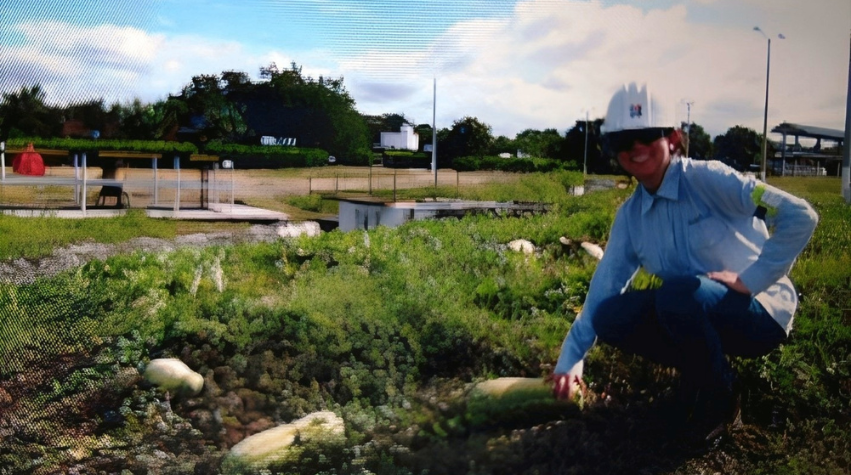
Laura at the Skybridge Park in Gatlinburg, Tennessee
Welcome to the latest in a series of AIChE blog posts profiling process engineers, a diverse group of professionals spanning multiple industries and regions. In this series, we profile process engineers who work in a wide range of fields, including petrochemicals, pharma, bulk chemicals, food, and other process-intensive industries.
Are you a member and process engineer interested in being profiled? We’d love to hear from you via this volunteer opportunity. Please also check out our online discussion group specifically for process engineers. You can find out about these initiatives and join our efforts by visiting aiche.org/process-engineers.
This month, we introduce you to Laura Rodriguez, process engineer II at Audubon Colombia. She discusses the path that led to her career in process engineering, overcoming challenges, and the importance of her work.
Tell us a bit about your work as a process engineer.
I work for a company that offers engineering services for the upstream side of the oil and gas sector. I am part of a team of process engineers that design processes to treat oil and gas to meet sales specifications. As a junior-intermediate process engineer, I help the senior process engineers perform multiple engineering calculations such as three-phase separators, glycol contactors, PSVs, and control valve sizing. This is in addition to other equipment and instrumentation design that is crucial to decrease the content of water, salts and sour content in oil and gas in the safest way possible.
I had the opportunity to work on Colombia onshore projects, as well as on U.S. offshore projects. In Colombia, I visited oil facilities to see how the process was working, firsthand, and to see the pipes and instrumentation that my team designed.
Why did you become a process engineer?
At university, I took a course called Oil and Gas Engineering. My Professor, Julio Vargas, broadly taught me the complex world of oil and gas; from the oil well to the conversion into everyday products. This was very interesting to me. A few years later, there was an open position for a process engineer in a small company linked to the oil and gas sector, and I was offered the job. I accepted the offer and began to learn about process engineering in the oil and gas sector.
This began my experience as a chemical and process engineer. Now I work for a company with offices in Colombia and the United States. It has been a great experience working with process engineers from other countries.
With the creation of [The Community of Process Engineers], I know that I can expand my knowledge and skills in process engineering at the hands of experienced engineers willing to share their valuable experiences.
What were some of the biggest challenges you faced in your role as a process engineer?
When I started working as a process engineer, it was very challenging since I had practically just graduated from university and had no experience in the field. I was also the only chemical engineer in the company, so I had no one to answer questions. I took it upon myself to research how to carry out the design of a crude oil treatment plant. I consulted books, the web, and process engineering forums.
For this reason, I thank AIChE for creating a community of process engineers that is nourished every day by process engineers themselves, both seniors and juniors, in such a way that I do not feel alone and overwhelmed when I have technical questions and no one to ask. Now, with the creation of this spectacular community, I know that I can expand my knowledge and skills in process engineering at the hands of experienced engineers willing to share their valuable experiences.
How is your work as a process engineer critical to your particular job assignment or industry?
In every project that comes to the engineering company where I work, the process engineering department I’m part of is the first discipline that receives a project. Based on experimental data provided by clients, we are the ones who determine which processes are necessary for the proper treatment of crude oil and gas for sale, and we are in charge of issuing one of the most important engineering documents: the instrumentation piping diagrams, or P&IDs, as well as the material and energy balances.

Other departments such as mechanical, electrical, instrumentation, and control engineering depend on our calculations and engineering products, which are vastly important when developing detailed engineering. This is why the company calls the process engineering department “the heart of the business.” It is critical for me to carry out my work with a high degree of quality, and to do things right from the beginning, taking advantage of resources such as time and gathering knowledge from other senior engineers. The success of the development of an engineering project depends on this.
What do you think is most important about what you do as a process engineer?
I have worked for about five years as a process engineer, and the most important thing I have done so far is being a sponge that absorbs knowledge from experienced engineers and applies it while designing processes that are efficient and safe to treat oil and gas. The commodities extracted from an oil well have to be sold in optimal conditions in order to be transformed into products such as plastics, gasoline, medicines, and other products used by the whole population. I look forward to continuing to learn and develop novel processes that optimize resources, and one day to becoming a valuable senior process engineer for the industry.
Connect with Laura on AIChE Engage
Join the Community of Process Engineers
The Community of Process Engineers is brought to you by Scott & Karen Love. Their support enables the AIChE Foundation to advance process engineers at every stage of their career allowing them to Do a World of Good.
AIChE Foundation – Doing a World of Good Campaign

If you are interested in learning more about professional development, networking, and interviewing, be sure to check AIChE Career DiscoveryTM, which is part of the Institute for Learning & Innovation (ILI). See upcoming instances of the Career Discovery Workshop on AIChE Academy and read more about the process here.
Learn more about professional development


